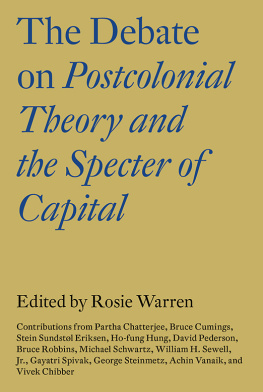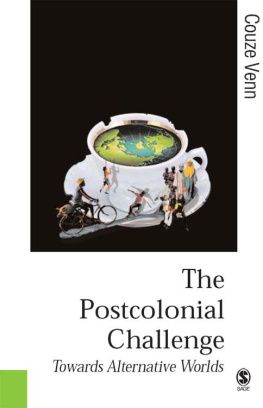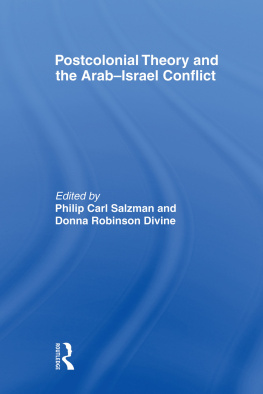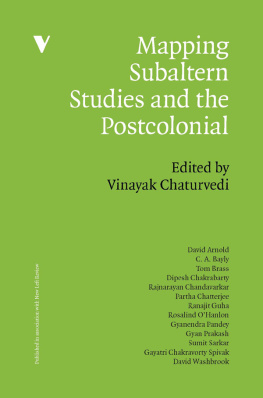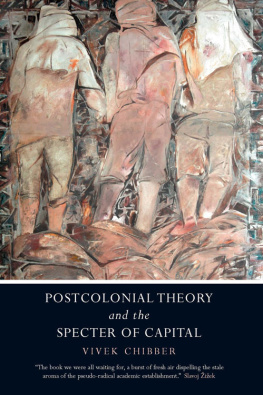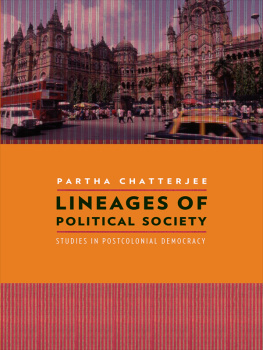THE DEBATE ON
POSTCOLONIAL THEORY
AND THE SPECTER
OF CAPITAL
EDITED BY ROSIE WARREN

First published by Verso 2017
The contributions The contributors 2017
The collection Verso 2017
All rights reserved
The moral rights of the authors have been asserted
1 3 5 7 9 10 8 6 4 2
Verso
UK: 6 Meard Street, London W1F 0EG
US: 20 Jay Street, Suite 1010, Brooklyn, NY 11201
versobooks.com
Verso is the imprint of New Left Books
ISBN-13: 978-1-78478-695-3 (PB)
ISBN-13: 978-1-78478-696-0 (LIBRARY HB)
ISBN-13: 978-1-78478-697-7 (US EBK)
ISBN-13: 978-1-78478-698-4 (UK EBK)
British Library Cataloguing in Publication Data
A catalogue record for this book is available from the British Library
Library of Congress Cataloging-in-Publication Data
Names: Chibber, Vivek, 1965 author.
Title: The debate on postcolonial theory and the specter of capital / Vivek
Chibber.
Description: Brooklyn, NY : Verso, 2016.
Identifiers: LCCN 2016033498 (print) | LCCN 2016036372 (ebook) | ISBN
9781784786960 (hardback) | ISBN 9781784786953 (paperback) | ISBN
9781784786977 ()
Subjects: LCSH: Postcolonialism. | BISAC: POLITICAL SCIENCE / History &
Theory.
Classification: LCC JV51 .C47 2016 (print) | LCC JV51 (ebook) | DDC
325/.301 dc23
LC record available at https://lccn.loc.gov/2016033498
Typeset in Minion Pro by Hewer Text UK Ltd, Edinburgh
Printed in the US by Penguin Random House
Contents
From time to time a few books have so wide an impact, eliciting such a large and varied range of responses that are completely or in part laudatory, hostile, and mixed, that one comes to realize that the original text has become a significant intellectual event in its own right. Vivek Chibbers Postcolonial Theory and the Specter of Capital (PTSC) is one such event which deserves to be paid the tribute of being followed by a volumeThe Debate on Postcolonial Theory and the Specter of Capitalcomprised of select commentaries on that original work along with authorial responses to them. This is not the first critique of either the theoretical trajectory of Subaltern Studies or of postcolonial theorizing. So why has it had such an impact? And why have published responses to it been far fewer and academic reception to it quieter in India than elsewhere, even though in many ways Chibbers book carries a special importance for Indian academia given the direction critical studies in Indias social sciences is currently taking? What, more generally, is the importance of the book?
From the mid-1980s onwards, there have been numerous works that criticized the theoretical pretensions of Subaltern Studies as a distinct school of historiography, especially after its alignment with the cultural turn associated with postmodernist, poststructuralist approaches. This gave rise to postcolonial forms of theorizing whose principal bugbear is the epistemic violence done by the use of Eurocentric conceptual categories (including much of Marxism) to try and understand what was once called the Third World and even the global history of modernity(ies), for which an epistemic parity of sorts is presumably required between European and non-European thought frames. The body of criticism of this turnin which there has often been an admirable defense of a modest universalism of categories and a theorization of modernity where the identification of causal mechanisms leans more strongly toward changes in political economy than cultural resiliencieshas targeted both Subaltern Studies and postcolonial thought. If PTSC has made waves by making similar critiques, this is partly because the wider political context has been conducive to its favorable reception but more so because of the distinctive and undeniable virtues of the text itself.
CONTEXT AND TEXT
The 1960s and 1970s were a period of such worldwide ferment that revolutionary transformations in which socialism would transcend capitalism seemed possible. These hopes faded in the 1980s and 1990s, particularly after the collapse of Communism, which brought no solace even to those currents on the Left that had been hostile to Stalinism and opposed to Maoism, regarding them as obstacles to the development of a genuinely democratic socialist order. For many disillusioned radicals the subsequent global ascendance of capitalism was accompanied by the narrowing of progressive political possibilities to the achievement of bourgeois liberal democracy now no longer even to be deemed bourgeois. Class struggle was no longer central; struggles against oppression of other identities besides class became more prominent. The material circumstances for encouraging both the fragmentation and academization of a progressive radicalism in thought and practice had emerged. Being a post-Marxist seemed better than being an ex-Marxist; the former implied a more benign forward movement, while the latter connoted regrettable wastefulness and stupidity in adherence to past loyalties.
However, the invasions in West and Central Asia and in North Africa by the US and Europe in the first decade of the new millennium, backed directly or indirectly by an expanding alliance network that now includes India, changed all this. Coupled with the biggest and most generalized capitalist crisis (2007/812) since the Great Depression (with negative consequences that have endured long past the crisis), these military endeavors threw the effects of a universalizing capitalism and state-backed manifestations of imperialism, not easily explained in cultural terms, into the spotlight. This is the context in which PTSC appeared.
In constructing his study of Subaltern Studies and postcolonial thought, Chibber rejected the use of a wide fish-eye lens. Instead, he analyzed in microscopic detail particular Subaltern Studies texts that sought to provide the theoretical framework for undertaking historical sociological studies of contemporary societies, and which have undoubtedly shaped much of the discourse in postcolonial studies. Postcolonial studies made its mark first in cultural studies but had a greater initial impact on historical sociology, and more specifically the historical sociology of contemporary capitalism and modernity. Subaltern Studies theorization became something of a standard-bearer for how such studies should be carried out. Chibbers focus on these studies was therefore quite fruitful; never before had key theoretical propositions emerging from the stable of Subaltern Studies that had aimed for and achieved wide influence in postcolonial studies been subjected to such intense scrutiny.
Chibber exercises scrupulous care in laying out the key arguments of the three major figuresRanajit Guha, Partha Chatterjee, and Dipesh Chakrabartywhose work he chooses to interrogate. He makes the most charitable interpretations where ambiguities exist: the opposing cases are as coherent as possible and his refutations that much more persuasive. His framing of opposing views and his arguments in response are presented with great clarity of expression, avoiding any linguistic or grammatical obscurity. You may agree or disagree with what he is saying, but you will not be confused by it. Michael Schwartz, a contributor to this volume, has even suggested that those seeking to understand the methodological and theoretical presumptions that claim to make Subaltern Studies a distinctive historiography may well turn to

